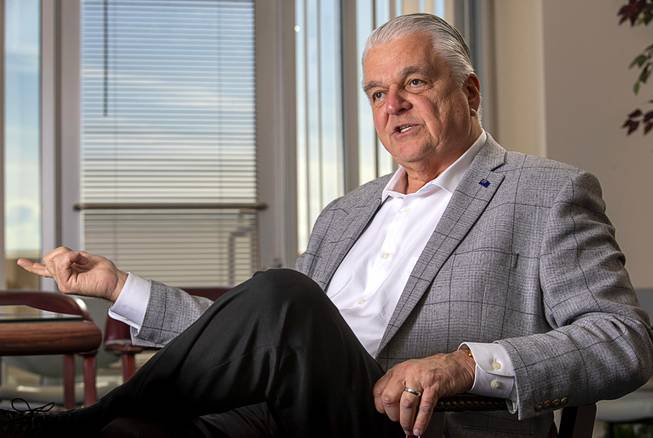
Nevada Governor Steve Sisolak responds to a question during an interview at his office in the Grant Sawyer State Office Building Thursday, Dec. 5, 2019.
Sunday, Jan. 19, 2020 | 2 a.m.
Gov. Steve Sisolak was annoyed. It was clear in his voice. The Clark County School District and the Clark County Education Association had been locked in a stalemate regarding teacher pay and compensation for months. A teacher strike seemed likely.
Then, Nevada’s first-year Democratic governor spoke up, forcefully instructing both sides to “get in a room, lock the door and figure it out.” Almost instantly, they came to a compromise. The teachers got a 3% pay increase, a 2% step increase, a 4% increase in CCSD’s contributions to monthly health insurance premiums and a $5,400 salary advancement for teachers who complete three years of professional development.
“The effort collectively, especially leadership at the state level, was critical to get this done for our 320,000 children,” School District Superintendent Jesus Jara said at the time.
Yes, Sisolak seems to have a penchant for deal-making.
Previously, tensions between the UNLV donor community and Nevada System of Higher Education leadership had prevented a deal from getting done, with then-university President Len Jessup’s resignation—which came amidst pressure from the Board of Regents—causing particular strife between some once-committed donors and leadership.
But Sisolak, the former Clark County Commissioner and longtime Las Vegan, brokered an agreement between UNLV and donors to fund the construction of a new medical school building.
He recently celebrated his first anniversary in office after a busy year of lawmaking.
Accomplishments
Sisolak is Nevada’s first Democratic governor in 20 years, overseeing a legislative session in which multiple Democratic landmark goals were passed. Those include raising the minimum wage from $8.25 to $12 an hour by 2024; passing legislation to make Nevada the fifth state to prevent insurance companies from denying coverage to patients due to pre-existing conditions; and overhauling the state’s 52-year-old school funding formula to give the Department of Education a larger say in where monies are distributed.
In his initial days in office, Sisolak also helped pass the “red flag” gun law, allowing authorities to seize firearms from those determined to be a threat to themselves or others. He also helped pass a separate bill requiring most private gun transfers to go through a state-run background check.
“To be able to come into a legislative session almost immediately after an election and say, ‘OK, here’s some priorities of things that we should get done’ and for us to be able to execute that, I think speaks to his leadership,” state Senate Majority Leader Nicole Cannizzaro, D-Las Vegas, said.
Sisolak also stood in vocal opposition to the Department of Energy’s plans to store nuclear waste at Yucca Mountain, speaking out when weapons-grade plutonium was secretly shipped from South Carolina to Nevada.
And yet, he says, “There’s still a lot of work to do.”
What’s next?
Sisolak stresses the need for states to step in to tackle climate change. Under President Donald Trump, an uninterested federal government has rolled back many actions taken by the Obama administration to mitigate climate change’s effects.
That includes such measures as reducing pollution at national parks and rescinding a proposal to establish guidelines to modernize public housing complexes, according to The Washington Post, which lists 70 environmental policies Trump has overturned or attempted to eliminate.
Nevada will do its share, Sisolak says.
“Would it be nice if we had a federal administration that was as supportive as I think our governors are? But that’s not the case, and [we] have to work with what we have,” Sisolak says. “We can’t wait for the president to change or for his opinion to change.”
Another issue on Sisolak’s agenda is education, where his focus will go beyond the classroom, toward ensuring children are ready to learn when they arrive at school.
“I want to make sure that these kids get fed, that their parents have a job if they’re looking for a job, that we have housing available [so] that people aren’t living … on the street, then going to school,” he says.
He also lists tackling criminal justice reform, finding a more permanent solution to school funding and environmental issues as priorities.
The presidential race
Democratic presidential candidates have flooded the state on the campaign trail over the past year ahead of the February 22 caucuses. So, who will Sisolak endorse?
Right now, he says, he’s not planning on endorsing any particular candidate. That decision aligns with other Nevada leaders like Sen. Catherine Cortez Masto and former Senate Majority Leader Harry Reid who have pledged neutrality heading into the caucuses.
“I can tell you this: Whoever the nominee is, I’m going to work as hard as I can to help them get elected, because I think it is important to us,” Sisolak said. “I really hope that this energy stays with the candidate who is ultimately chosen.”
This story appeared in Las Vegas Weekly.
